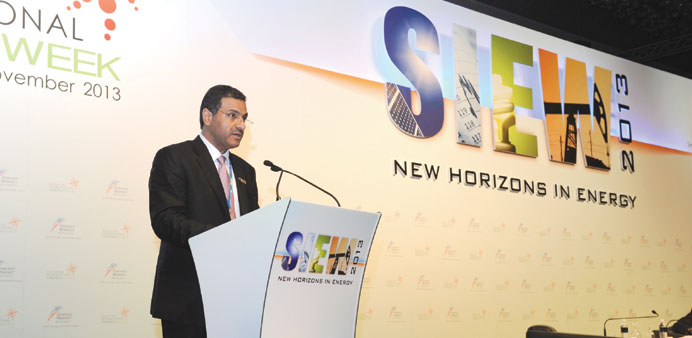Qatargas CEO Sheikh Khalid addressing the Singapore International Energy Week.
Demand for “cleaner and flexible” energy sources from emerging economies such as China and India provides prospects for liquefied natural gas, said Qatargas CEO Sheikh Khalid bin Khalifa al-Thani.
He was delivering the opening keynote address at the Singapore International Energy Week (SIEW) in the city state.
“Driven by robust economic growth coupled with rising urban populations and improved standards of living particularly in China and India, Asian economies are demanding not only more energy but also cleaner and more flexible energy sources with LNG expected to fill a sizable part of such demand,” the Qatargas CEO said.
In 2012, Asia imported an additional 15.6mn tonnes of LNG over the 2011 figure, which represents a year-on-year increase of 10%. As a consequence of its nuclear reactors shutdown, Japan alone represented over 50% of the Asian LNG consumption growth with imports reaching 87.5mn tons in 2012.
Over the next three years, new LNG receiving terminals with a total capacity of 23mn tonnes per year will be added in China alone. Moreover, there are currently a dozen new LNG terminal projects at various planning stages.
Similarly, India is expanding its LNG receiving capacity and its gas pipeline network to pave the way for increased imports over the coming years.
“South East Asian LNG demand is expected to be well over 40mn tpy by 2025 and will account for 13% of total Asia Pacific demand. Several factors are driving this increasing LNG demand, including this region’s strong economic growth, the need for diversified gas supplies and to offset declining legacy and remote gas supply sources,” Khalid bin Khalifa said.
His speech focused on the diverse challenges facing the global LNG market including pricing, outlook and structural issues in two other key markets - North America and Europe..
The Qatargas CEO highlighted the trade partnership between Qatar and Singapore, which has witnessed significant growth over the past few years. He also underlined Qatargas’ solid relationship with Singapore LNG.
In March this year, Qatargas supplied the first ever cargo of LNG into Singapore for the commissioning of its LNG’s new regasification terminal, a significant milestone for Qatar in its role in meeting the growing South East Asian energy demand.
Assessing the impact of shale gas production on the North American market he said:
“In North America, the resilient shale gas production growth combined with infrastructure development has helped maintain a low domestic gas price environment.
These low gas prices have contributed to stimulating a switch to natural gas fuelled electricity generation, providing a significant boost to the petrochemical and manufacturing industries and set the stage for a significant expansion of natural gas use as fuel for transportation.”
On the current LNG scenario in Europe, he said: “The continued economic slowdown coupled with the impact of European energy and climate change policies and their unintended effects on the energy markets has seriously dampened and even reversed in some cases the growth of gas consumption that was achieved in the continent during the last decade.”
However, his outlook on the future of the European LNG market was “positive”.
“There is no doubt that the European economies will start recovering in the near future and consequently, gas consumption growth will return. While at the same time, European domestic gas production continues to decline.
“We are therefore hopeful that the serious loopholes and inconsistencies in energy and climate change policies will be addressed and corrected soon to encourage long term investment in gas infrastructure and enhance the energy security of Europe.” he said.
About LNG pricing, the Qatargas CEO said: “Gas prices will remain regionalised for the foreseeable future and the North American exports pricing structure will not attain the scale and pace that would allow it to significantly alter the current pricing structure in the regional markets of Europe and Asia.
“Therefore, in my opinion, the current expectations from consumers regarding the long-term LNG supply/demand balance and price trend may be overly optimistic.”
“We believe that gas demand is outstripping gas supply especially in the Asia-Pacific region and that traditional forms of contracting will still be required to encourage sufficient growth in LNG supply” he added.

